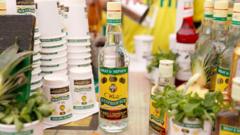A legal dispute in Jamaica highlights the complexities of defining ‘Jamaican rum,’ as distilleries argue over amendments that prohibit aging rum overseas.**
Defining Jamaican Rum: A Cultural Dispute Unfolds in the Caribbean**

Defining Jamaican Rum: A Cultural Dispute Unfolds in the Caribbean**
Tensions rise as Jamaican rum producers clash over the definition and geographical indication of 'Jamaica Rum.'**
The question of what constitutes a true Jamaican rum is at the core of a brewing legal dispute among distillers on the Caribbean island. As some rum producers push for stricter regulations on the designation of "Jamaican rum," the cultural significance of this beverage is being tested.
In October 2022, Jamaica's Intellectual Property Office (JIPO) made significant amendments to the geographical indication (GI) for Jamaican rum, which was initially established in 2016. Notably, the new regulations prohibit aging rum outside of Jamaica, a change advocated by the Spirits Pool Association (SPA), which represents six distilleries, including notable producers like Appleton and Worthy Park Estate.
The SPA asserts that stronger GI protections are essential for safeguarding Jamaican rum in key markets such as the EU and US, which is critical for elevating its status as a premium product recognized for its rigorous quality standards tied to its geographic origin. The association believes that without these protections, Jamaican rum is vulnerable to rival products.
However, the amendments have ignited controversy, particularly for National Rums of Jamaica (NRJ), which controls significant rum assets, including Long Pond and the bulk of Clarendon. NRJ, whose ownership includes the government of Jamaica and entities from Guyana and Barbados, argues that aging rum abroad, a long-standing practice, does not strip it of its Jamaican identity. This company is appealing the JIPO's decision, setting the stage for a hearing later this month.
The SPA maintains that true Jamaican rum must undergo aging in Jamaica to preserve its authenticity and integrity. Their perspective emphasizes that offshoring production processes deprives Jamaica of economic opportunities tied to the rum tourism sector and reduces local value-added benefits like refining, bottling, and labeling.
Litigations surrounding geographical indications highlight their economic and cultural stakes. According to Dev Gangjee, an intellectual property law professor at the University of Oxford, GI products can demand a price premium, anchor local production, and enhance regional advertising and tourism.
The GI debate in Jamaica echoes similar disputes in nearby Barbados, where efforts to establish a GI for its rum have also met resistance. The sole opposition comes from Wird, the entity that shares interests across both Caribbean islands. Local producers in Barbados express frustration at the lack of GI classification, emphasizing the need for industries that are deeply rooted within their regions.
While the SPA hopes to pursue the EU's Protected Geographical Indication status, it acknowledges that the ongoing legal proceedings create uncertainty. The SPA's managing director, Christopher Gentles, is optimistic that a resolution could be reached, albeit one that might require compromises from both sides.
The Jamaican newspaper, The Gleaner, has praised the JIPO for its decision, advocating for the integrity of Jamaican products against foreign appropriations. The collective sentiment resonates with Jamaica's historical and cultural ties to rum, underlining the fervent desire to preserve its legacy amidst evolving global business dynamics.



